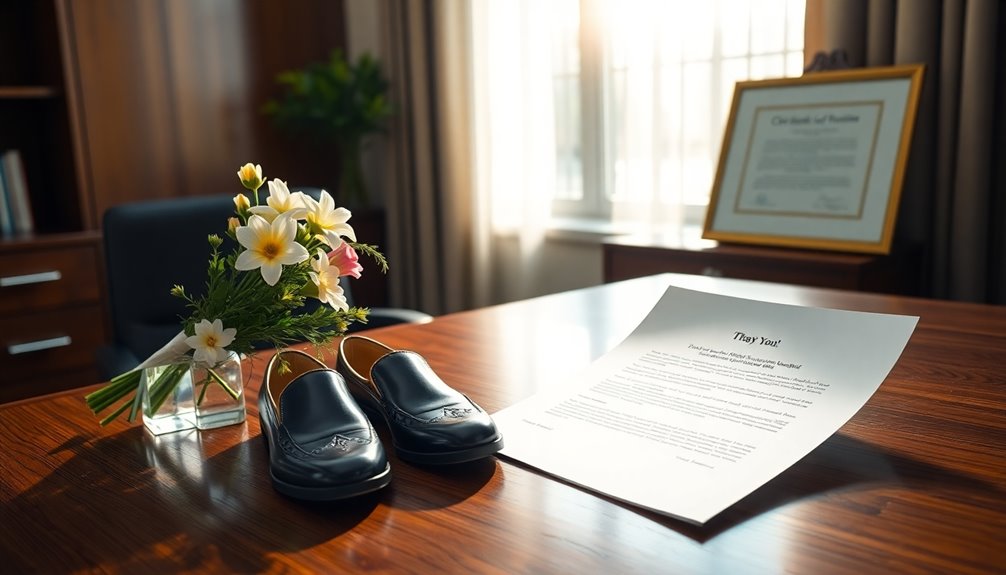When you need to decline a job interview, it's important to do so politely. Start by understanding your reasons for declining, whether it's accepting another offer or misalignment with the role. Communicate your decision promptly, ideally within 48 hours. Keep your message brief and clear; express gratitude for the opportunity and acknowledge the hiring team's efforts. Mention your interest in staying connected for future openings that might better align with your goals. By maintaining professionalism and goodwill, you leave the door open for potential opportunities. You might find more effective tips to keep those connections strong.
Key Takeaways
- Respond within 48 hours to show respect for the hiring manager's time and efforts in scheduling the interview.
- Express gratitude for the opportunity and acknowledge the resources invested by the company in the hiring process.
- Clearly state your reason for declining, whether it's due to accepting another offer or misalignment with your career goals.
- Maintain a positive tone, reinforcing your desire to stay connected for potential future opportunities.
- Suggest connecting on professional platforms like LinkedIn to keep communication open for future roles that may align with your skills.
Understand Your Reasons

Understanding your reasons for rejecting a job interview is essential before making any decisions. You might find yourself declining an interview due to accepting another job offer or discovering that the company's values don't align with your own. It's also common to realize that the role doesn't fit your current career goals, which could influence your choice.
Since research shows that about 47% of applicants get interviews after applying to around ten jobs, you likely have multiple options to evaluate. Changes in personal circumstances, such as family commitments or shifts in your career aspirations, can also play a significant role in your decision-making process.
Maintain Professionalism

When you need to decline a job interview, timely communication is key. Make sure to express your gratitude for the opportunity, as this leaves a positive impression. Keeping your response professional not only respects the hiring team's efforts but also keeps the door open for future opportunities.
Timely Communication Importance
Timely communication is essential in maintaining professionalism during the job interview process. When you receive an interview invitation, responding promptly—ideally within 48 hours—shows respect for the employer's time and effort. This quick reply not only reflects positively on your character but also allows hiring managers to adjust their candidate search efficiently.
If you delay your response, it might lead to frustration on the employer's side, potentially damaging your reputation and future prospects within the organization. Employers appreciate candidates who communicate effectively, as it sets a positive tone for any future interactions.
#
Express Gratitude
Always
Acknowledging the effort that goes into arranging an interview is key to maintaining professionalism throughout the hiring process. When you decide to decline an interview, make sure to express gratitude for the opportunity. A simple "thank you for the opportunity" goes a long way in leaving a positive impression. This not only shows respect for the time and resources the hiring team invested but also enhances your professional reputation.
By appreciating the invitation, you help maintain a professional relationship, which can be valuable as hiring managers often shift between companies. They'll remember your respectful demeanor, making it more likely they'll consider you for future openings.
Recognizing the effort involved in the selection process demonstrates professionalism and respect, key traits in any industry. Plus, expressing gratitude can open doors for potential referrals or networking opportunities down the line, fostering goodwill and positive connections.
Communicate Promptly

When you receive a job interview invite, responding within 48 hours shows you respect the hiring manager's time. Quick communication helps minimize scheduling conflicts and keeps the recruitment process moving smoothly. Plus, it fosters positive professional relationships that could benefit you down the line.
Respect Hiring Manager's Time
Respecting the hiring manager's time is essential in the job interview process, and responding promptly to an interview invitation is a key part of that. When you need to decline the interview, aim to communicate within 48 hours. This shows you respect the hiring manager's time and effort in the recruitment process. Timely communication allows the hiring team to adjust their schedules and seek other candidates without unnecessary delays.
Consider these points when you decline the interview:
- A quick response helps the hiring manager avoid investing resources in a candidate who's unavailable.
- It reduces frustration and reflects positively on your professionalism.
- A timely decline sets a positive tone for any future opportunities with the organization.
- It helps maintain a professional relationship for potential roles down the line.
Minimize Scheduling Conflicts
Minimizing scheduling conflicts is essential for maintaining a smooth hiring process. When you receive an interview invitation, responding promptly—ideally within 48 hours—demonstrates respect for the employer's time. If you decide to decline a job interview, timely communication allows the hiring manager to make alternate arrangements and move forward with other candidates.
A quick acknowledgment of the invitation sets a positive tone, regardless of your choice. Delaying your response might reflect poorly on your professionalism and could impact future opportunities with that organization. Clear communication about your decision to decline helps prevent misunderstandings and keeps the recruitment process efficient.
Foster Professional Relationships
Fostering professional relationships hinges on your ability to communicate promptly. When you receive a job interview invitation, responding within 48 hours shows respect for the employer's time and highlights your professionalism. By doing so, you allow the hiring manager to adjust their plans and consider other candidates, streamlining the recruitment process.
Here are some tips to maintain a positive interaction:
- Acknowledge the invitation quickly, even if you plan to decline.
- Be clear about your decision and express gratitude for the opportunity.
- Consider providing a brief reason for your decline, if appropriate.
- Keep the door open for future opportunities by expressing interest in staying connected.
Timely communication not only sets a positive tone for future interactions, but it also helps you maintain open communication with the company. Remember, delayed responses can reflect poorly on your professionalism. By communicating your decision promptly, you enhance your professional relationships, ensuring that you remain a considerate candidate for any potential future roles. Additionally, maintaining clear communication channels can also be beneficial in other professional contexts beyond job interviews.
Keep It Brief

When rejecting a job interview, keeping your message brief is crucial. A concise response shows respect for the employer's time and guarantees effective communication. Hiring managers are often juggling multiple candidates, so aim to send your decline within 48 hours. This clarity helps prevent misunderstandings about your candidacy status.
Here's a quick reference table to guide you:
| Action | Purpose |
|---|---|
| Keep it brief | Shows respect for the employer's time |
| State your decision | Provides clarity about your intentions |
| Use simple language | Avoids overwhelming the recipient |
| Limit unnecessary details | Keeps the focus on your main point |
Your message should focus on expressing gratitude and clearly stating your decision to decline an interview. A short communication is more likely to be well-received than lengthy explanations, which can dilute your message. By keeping it brief, you maintain professionalism and leave the door open for future opportunities. So, remember to be clear, concise, and polite when you decline an interview.
## Express Gratitude

After keeping your message brief, the next important step is to express gratitude. A simple "thank you" at the beginning of your decline message can not only acknowledge the effort the hiring team put into reviewing your application but also foster goodwill. This gesture helps maintain a positive relationship, which is essential for job seekers steering their careers.
Here are some ways to effectively express gratitude in your response:
- Thank them for the opportunity to interview or discuss the role.
- Recognize the time and resources the employer invested in the recruitment process.
- Reflect on something specific you appreciated about your interactions, like their communication style.
- Mention how their consideration has positively impacted your professional reputation.
Offer Future Connections

Keeping the door open for future connections is a smart move after rejecting a job interview. By expressing your willingness to stay in touch, you create an opportunity for potential openings down the line. Let the recruiter or hiring manager know that you appreciate the chance to interview, and you're interested in following their company's progress. This shows you value their work and want to maintain a positive impression.
You might suggest connecting on professional platforms like LinkedIn. This simple act can help you remain within their network. Additionally, if you know someone who would be a great fit for the role, offering a referral demonstrates your appreciation and contributes to a mutually beneficial professional network.
Finally, express genuine interest in future openings. Reinforcing that you'd like to be considered for roles that align with your skills can keep you on their radar. Maintaining ongoing communication enhances your professional reputation and may lead to unexpected opportunities later. In the end, offering future connections not only preserves relationships but also sets the stage for exciting possibilities in your career. Furthermore, establishing these connections can be vital for creating a retirement savings plan as networking often leads to better job opportunities and financial benefits.
Frequently Asked Questions
How Do You Respectfully Decline an Interview?
When you need to respectfully decline an interview, respond promptly, ideally within 48 hours. Start by thanking the hiring manager for the opportunity and acknowledging their effort. Clearly state your decision without going into excessive detail. If you wish, you can briefly mention a reason, like accepting another offer. Finally, express interest in staying connected for future opportunities, as maintaining a positive relationship can be beneficial for your career later on.
How to Turn Down a Job Interview but Keep the Door Open?
Imagine standing at a crossroads, one path leading to a job you don't want. It's okay to turn down that interview while keeping the door open. Thank the employer for the opportunity and express your appreciation. Politely state your decision, but suggest staying connected for future roles. You could even recommend a colleague who might fit. This way, you leave a positive impression and maintain a potential route back to the company later.
How to Tell a Job You Don't Want to Interview?
When you decide not to interview for a job, respond promptly, ideally within 48 hours. Thank the employer for the opportunity and acknowledge their effort in considering you. Clearly state your decision to decline without oversharing. You might mention a general reason, like accepting another offer. Keep your tone positive, expressing interest in future opportunities with the company. This approach maintains professionalism and can help keep the door open for future interactions.
How Do You Gracefully Cancel an Interview?
To gracefully cancel an interview, respond promptly, ideally within 48 hours. Start by thanking the hiring team for the opportunity; it shows respect for their time. Keep your message brief and clear, simply stating your decision without going into unnecessary details. Maintain a polite tone to guarantee professionalism. If appropriate, express interest in future opportunities with the company, leaving the door open for potential collaborations down the line.
Conclusion
To wrap things up, rejecting a job interview doesn't have to be awkward. Just remember to be polite and professional, and you'll leave a positive impression. By understanding your reasons and communicating promptly, you guarantee that you're not burning bridges—after all, you never know when you might cross paths again, like a dial-up modem reconnecting with an old friend. Keep it brief, express gratitude, and who knows? The future might hold more opportunities for you!
Felicity, our Author, pens in-depth articles and guides that delve into the heart of personal discovery. Her narrative-driven approach weaves together theory, practice, and personal anecdotes, making the journey of self-exploration both relatable and inspiring. Felicity’s contributions help illuminate the path for those seeking a deeper understanding of themselves and their relationships.










